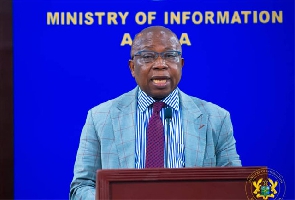 Kwaku Agyeman-Manu, Minister of Health
Kwaku Agyeman-Manu, Minister of Health
Kwaku Agyeman-Manu, the Minister of Health, has called on all ministries, agencies and sectors to explore platforms through, which Neglected Tropical Diseases (NTDs) interventions can leverage on and be integrated for greater outcomes.
He said this was necessary as the country built relevant mechanisms towards strengthened cross-sector partnerships and sustainability in NTD for broader health programming.
Mr Agyeman-Manu made the call in a speech read on his behalf at the relaunch of Ghana’s Intra-Country Coordinating Committee (ICCC) for NTDs in Accra.
He said the Government was committed to country ownership and domestic funding of key interventions and programmes towards the control and elimination of NTDs.
“This fits into the larger national framework of President Nana Akufo Addo’s ‘Ghana Beyond Aid’ agenda,” the Minister, stated.
He said though the country had made significant strides towards the control and elimination of NTDs, there was still much to be done to achieve the World Health Organization’s elimination and control target by 2030.
The Minister stated that the emergence of the COVID-19 pandemic globally had reiterated the need for multi-sector coordination and collaboration within and outside the health community.
Mr Agyeman-Manu said it was government’s hope that members of the committee, drawn from various relevant sectors would contribute towards sustainability in NTD programming in Ghana.
He, therefore, encouraged the Committee to embark on intensive research to strengthen sustainable evidence-based NTD programming for greater impact and broaden opportunities for domestic resource mobilization.
“Lessons and best practices in other NTD endemic countries should be contextualized and replicated for NTDs in Ghana,” he added.
The purpose of the multi-sectoral coordination mechanism is to ensure ownership of the programmes as a basis for the implementation and funding of NTD initiatives in Ghana.
Dr Patrick Kuma Aboagye, the Director-General of the Ghana Health Service, said the Committee formed a critical component in deepening relevant sector participation in ensuring sustainability in NTD geared towards the control and elimination.
He said the objectives of the Committee was to advise the programme on all technical issues pertaining to the elimination of NTDs and to provide oversight in ensuring cross-sectorial coordination and collaboration for NTD programmes in Ghana.
It is also aimed at providing national advisory on integrating the NTD programming, resource mobilization, and advocacy into the national health system for sustainability, among others.
The Director-General said more than one billion people, one-seventh of the world’s population, suffered from one or more NTDs, therefore, having the Committee was appropriate and timely due to the collapse of the previous one launched in 2013.
Dr Aboagye said the three sub-committees- Technical, Advocacy, Communication and Social Mobilization (ACSM), as well as Resource Mobilization, would sit under the ICCC governance body.
He said there was evidence that water, sanitation, and hygiene (WASH) played a major role in addressing the concerns, thus, the need to identify best practices for collaborative programming.
“This will identify the most effective, sustainable, and scalable methods of integrating WASH and NTD control activities,” he added.
The Director-General urged the Committee to ensure that collaboration between the NTD programme and WASH were intensified for good outcomes.
He said the revamped ICCC must not fail because they had all the experts and sectors, adding, “What is needed as alluded to, earlier is the commitment towards the collaboration”.
Dr Mrs Joyce Aryee, NTDs Ambassador, who chaired, urged the committee to work assiduously to ensure the success and realisation of the total eradication target of NTDs by 2030.